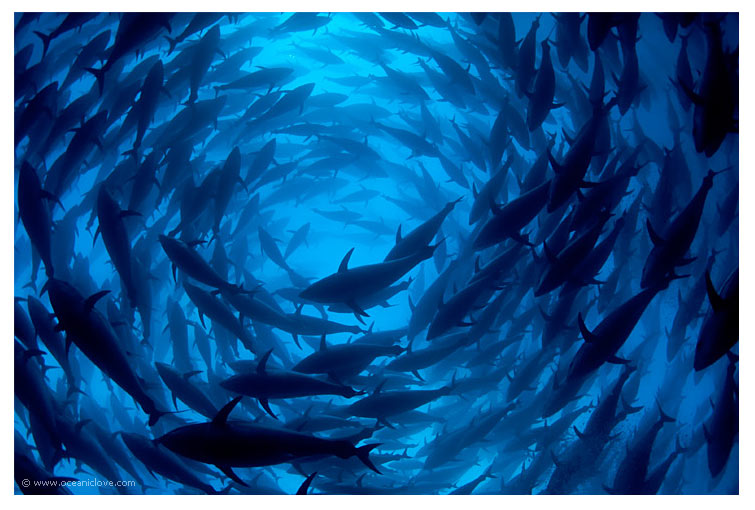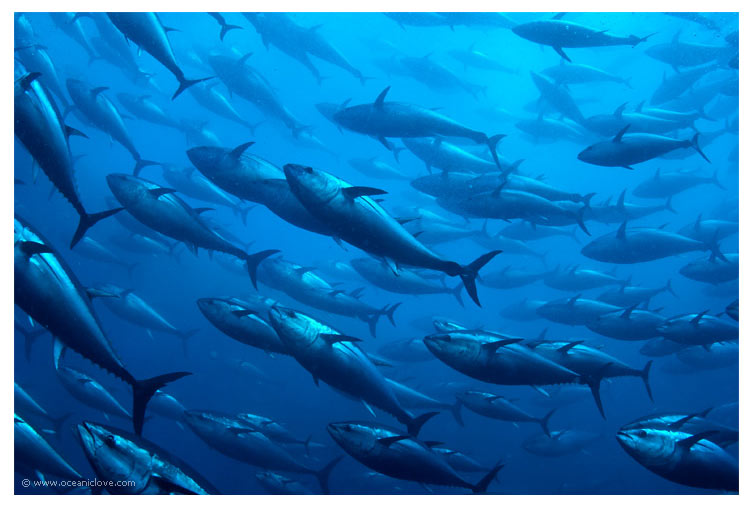
The fate of one of the ocean's largest fish and most important apex predators will be on the table at an inter-sessional meeting of The International Commission for the Conservation of Atlantic Tunas (ICCAT) to take place February 21-25th in Barcelona, Spain. According to a recent report from the Associated French Press, several countries have failed to deliver their plans for recovery of tuna stocks to the ICCAT, which may provide some critical and overdue relief for the blue fin tuna. European Maritime Affairs and Fisheries Commissioner Maria Damanaki recently issued a letter to Spain, Italy, Malta, Cyprus and Greece, warning that the European fleet may not be allowed to catch its 2011 quota if the EU does not provide the recovery plans within the allotted time frame.
According to the founder of the European based group, The Blackfish, Weiste van der Werf, "It seems that there could be a real danger that ICCAT will not allocate bluefin quotas for these EU nations this year. However, as most nations don't enforce the regulations properly, there is a real possibility that vessels will still illegally depart from their ports."
In 2010, conservationist officials from the United States and European Union met in Qatar to pass and implement a global ban on the trade of bluefin tuna. Yet despite its current status by the IUCN red list as critically endangered, the motion was rejected as nations including Indonesia, Canada and Japan -- the largest global consumers of bluefin -- argued for more sustainable industry management practices in the future. Environmental scientists and conservationists were deeply disappointed by the decision as current research studies indicate that bluefin stocks have plummeted by approximately 85 percent since the era of industrial fishing began.
 Photo courtesy: Gary Stokes/www.oceaniclove.com
Photo courtesy: Gary Stokes/www.oceaniclove.com
In 2010, The Sea Shepherd Conservation Society launched a direct action campaign in the Mediterranean, Operation Blue Rage. According to Captain Paul Watson, the aim of the campaign was,
"one, to uphold international conservation law by intervening against illegal fishing activities; two, to physically free and protect blue fin tuna caught illegally; three, to focus international media attention on the need to protect and conserve blue fin tuna; and four, to motivate other NGOs and governments to take action to protect the blue fin."
While Watson and his crew sucesssfuly released 800 blue fin in Libyan waters during the campaign, the blue fin remains in serious danger by the escalating threat of extinction. In the following interview conducted in Cannes, France, he shed light on the the urgency of the situation and the necessity of continued direct action to protect the species from the greedy culprit of commercial overfishing.
Deborah: What is the current status of the bluefin tuna and how did it get to this critical point?
Paul Watson: The bluefin tuna (BFT) should have been listed by The Convention on International Trade in Endangered Species (CITES) as endangered but CITES has tossed out science as the criteria for listing and has replaced it with politics and economics. The BFT is in trouble and could be extinct within a few years. Continued exploitation of the BFT is ecologically irresponsible. But with a price of over $100,000 on its head, the days are numbered for this unique species. Mitsubishi is literally investing in extinction -- the more BFT they can catch and store in refrigerated warehouses, the more diminished the populations in the wild, and diminishment translates into increased value of the dead BFT in the warehouses. I call this the politics of extinction.
Deborah: Can you please briefly explain the law of diminishment and how it is relevant to the current state of the oceans?
Paul Watson: The first law of ecology is the law of diversity, the second law is the law of interdependence and the third law is that of finite resources or a limit to growth and a limit to carrying capacity. Diminishment of numbers within a species leads to diminishment of species and diminishment of species leads to diminishment of interdependence between species and thus leads to reduced carrying capacities. Removal of one species leads to consequences to other species and thus to consequences to ourselves.
Deborah: What could potentially happen if an apex predator such as the bluefin tuna were to go extinct?
Paul Watson: Removal of predators does have consequences. The present rate of diminishment of all fish species is going to bear negative consequences for the entire oceanic ecosystem.
Deborah: How can the average person help to curb the rapid loss of this particular species?
Paul Watson: We need to stop eating the oceans, which means we need to stop eating fish and we need to stop feeding fish to domesticated animals like pigs, chickens, and cats. We need to work to get international conservation laws upheld and enforced. Governments must become more aggressive and tougher in upholding laws and NGOs need to become more hands-on and more motivated.
Deborah: Thanks Paul and keep up the great work out there!
 Photo courtesy: Gary Stokes/www.oceaniclove.com
Photo courtesy: Gary Stokes/www.oceaniclove.com
Weighing up to 1,500 lbs, the bluefin are often transported to so called 'open water' ranches where they are fed and fattened up in order to increase their value. While fisherman argue that these methods are both sustainable and ethical, critics condemn these practices and maintain that there is a severe lack of accurate data over quotas and how many fish are actually taken each year. Some scientists predict that at the current rates, the bluefin could become extinct -- as in banished from the Earth forever -- in as little as one year.
"The quotas that have been set during the fishing season are unrealistic--these fish simply can't replace themselves at the rate they are being removed," noted Sea Shepherd crew member, Tim Webber. While fellow crew member, Shannon Mann added, "We are at a tipping point. By losing top predators, such as sharks and bluefin tuna, the entire delicate balance of the ocean ecosystem is severely disrupted and will inevitably lead to the overall collapse of a healthy, living ocean. There is simply no time to hesitate on this matter."
The following innovative video was created by the founders of a new project based in Belgium called howtosavethebluefin.com and provides a solid background on the history, politics and economics behind the blue fin tuna crisis.
"We were inspired to use our skills and tools in advertising to create a campaign that has a positive impact on society. Raising awareness is very important and we believe that every person that has watched our video has been educated on a very serious issue," said Co-founders, Diederik Jeangout and Michael Dilissen. "We are also executing some more hands on campaigns, that will have a positive impact as well." Updates may be found on the howtosavethebluefin.com website.
We have reached a critical juncture in time when the immediate actions that we take today as a global society will directly effect the very existence of certain species and ultimately the entire web of life on the planet as we now know it. Do we not owe it to our future generations to leave behind the healthiest, most harmonious planet possible according to the basic laws of science and nature? The dire crisis facing the bluefin tuna acts as a barometer for the overall state of the oceans -- as well as humanity -- and we must take all measures necessary to insist that international governing bodies and policy makers take the crucial steps to ensure the vital survival of this critically endangered species, including our own.
For more information on this important topic and to find out how you make take action today, please visit: